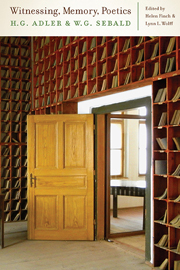Book contents
- Frontmatter
- Contents
- Acknowledgments
- List of Abbreviations
- Introduction: The Adler-Sebald Intertextual Relationship as Paradigm for Intergenerational Literary Testimony
- Part I Intertexts in Context
- Part II Witnessing Trauma and the Poetics of Witnessing
- 4 Bearing Witness: The Poetics of H. G. Adler and W. G. Sebald
- 5 “Schmerzensspuren der Geschichte(n)”: Memory and Intertextuality in H. G. Adler and W. G. Sebald
- 6 “Der Autor zwischen Literatur und Politik”: H. G. Adler's “Engagement” and W. G. Sebald's “Restitution”
- Part III Memory, Memorialization and the Re-Presentation of History
- Part IV Literary Legacies and Networks
- Afterword
- Bibliography
- Notes on the Contributors
- Index
4 - Bearing Witness: The Poetics of H. G. Adler and W. G. Sebald
from Part II - Witnessing Trauma and the Poetics of Witnessing
Published online by Cambridge University Press: 05 October 2014
- Frontmatter
- Contents
- Acknowledgments
- List of Abbreviations
- Introduction: The Adler-Sebald Intertextual Relationship as Paradigm for Intergenerational Literary Testimony
- Part I Intertexts in Context
- Part II Witnessing Trauma and the Poetics of Witnessing
- 4 Bearing Witness: The Poetics of H. G. Adler and W. G. Sebald
- 5 “Schmerzensspuren der Geschichte(n)”: Memory and Intertextuality in H. G. Adler and W. G. Sebald
- 6 “Der Autor zwischen Literatur und Politik”: H. G. Adler's “Engagement” and W. G. Sebald's “Restitution”
- Part III Memory, Memorialization and the Re-Presentation of History
- Part IV Literary Legacies and Networks
- Afterword
- Bibliography
- Notes on the Contributors
- Index
Summary
The act of bearing witness is ineluctably dependent on real places, real events, and the utterances of real people. As such it stands in tension with Aristotelian poetics, which suggests that poets should leave the stuff of actuality to the historiographers: “It is not the poet's function to relate actual events, but the kinds of things that might occur and are possible in terms of probability or necessity.” Whereas the historian relates actual events and focuses on “the particular,” poetry is “more philosophical” and “elevated” since it “relates more of the universal.” In the German context, this philosophically oriented approach to literature was given aesthetic underpinning in the Age of Idealism, which evolved the antirhetorical ideal of the “free,” autonomous literary work of art that is liberated from the lowly constraints of historical fact and moral argument. More than any other literary tradition, however, German literature has come under pressure from historical reality. The crimes perpetrated against the Jews under National Socialism have posed an ongoing challenge, demanding conceptualization, articulation, and engagement. German literature was automatically implicated because it depends on the language used to instigate, perpetrate, and conceal those crimes, and because German was the natural language of most of those who—in various roles—witnessed the crimes as participants.
- Type
- Chapter
- Information
- Witnessing, Memory, PoeticsH. G. Adler and W. G. Sebald, pp. 81 - 111Publisher: Boydell & BrewerPrint publication year: 2014

